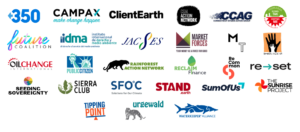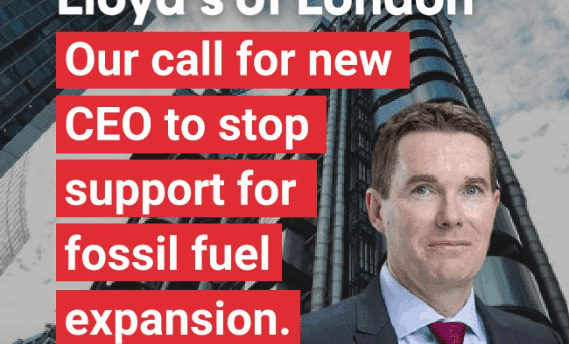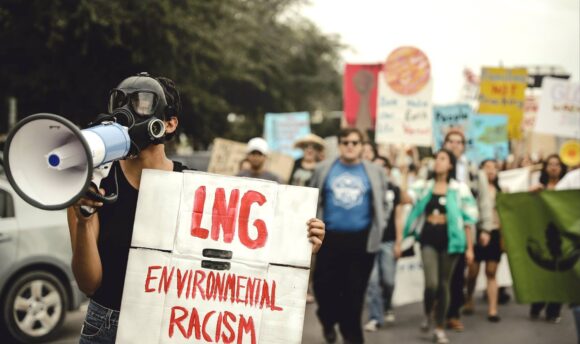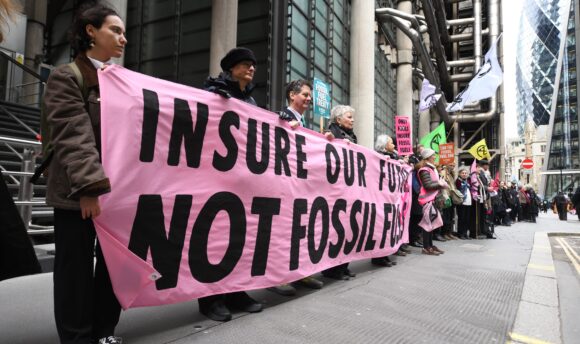27 NGOs, as part of the Insure Our Future network, sent the following letter to insurance and reinsurance company CEOs on March 10, 2022
Dear insurance/reinsurance company CEO,
The impacts of climate change are becoming ever more tangible and severe. July 2021 was the hottest month humanity has ever recorded and the last seven years have been the hottest on record. Natural disasters including severe floods, droughts, winter storms and typhoons caused losses of $280 billion in 2021 – the fourth highest in history – according to Munich Re.
Behind these figures lies devastating human misery. Millions of people are losing their homes, livelihoods and food security to natural disasters. Thousands are losing their lives. More and more households and businesses in regions exposed to high climate risks are also losing access to insurance, even while insurance companies continue to offer cover to the fossil fuel industry.
World leaders recommitted to the goal of limiting climate change to 1.5°C at the COP26 Glasgow climate summit and recognized that this requires a 45% cut in carbon dioxide emissions by 2030. The world’s leading climate scientists on the Intergovernmental Panel on Climate Change (IPCC) have warned that even half a degree beyond this would significantly worsen the risks of drought, floods, extreme heat and poverty for hundreds of millions of people.
The main driver of climate change is burning fossil fuels. Since we last wrote to you, the International Energy Agency (IEA) has confirmed in its Net Zero by 2050 Roadmap that if we are to meet 1.5°C there is no space for any expansion of coal, oil, or gas production, and that current production needs to be phased out. The IPCC reaches the same conclusion in the no/low overshoot pathways of its 1.5°C report, as does the One Earth Climate Model (which the Net-Zero Asset Owners Alliance has called the “most effective” tool for climate pathways).
Yet production of fossil fuels continues to increase, in spite of the net-zero commitments of numerous governments and businesses. Coal consumption has rebounded sharply from the slump of 2020 and, according to the IEA, “could reach new all-time highs as soon as 2022” and remain at this level for years. Global gas consumption likewise rebounded by more than double the decline it experienced in 2020. The IEA also projects oil consumption to grow to 103 million barrels per day (mb/d) by 2025 rather than dwindling to 80 mb/d as required by its net-zero pathway.
If we are to avoid the worst impacts of climate change, all companies must align their business activities with a credible pathway to 1.5°C. The insurance industry, as society’s risk managers, has a particular responsibility to act and a huge power to drive change. Without insurance new fossil fuel projects cannot be built and most existing ones cannot continue to operate.
Many leading insurers are already taking action, but not yet at the speed and scale required. At least 37 insurance companies have adopted policies of varying quality to restrict their underwriting of coal. Five have taken initial steps to restrict their underwriting of non-conventional and conventional oil and gas. Important gaps remain and some major fossil fuel insurers have failed to adopt any meaningful policies.
More than 20 insurance companies have joined the Net-Zero Insurance Alliance (NZIA), committing to transition their insured emissions to net zero by 2050 in line with a 1.5°C target. The NZIA is currently preparing a protocol to measure and disclose insured emissions in cooperation with the Partnership for Carbon Accounting Financials, and a protocol for setting emission reduction targets will follow.
These are promising moves but should not be used as an excuse to delay the urgent action needed to address the climate emergency. The IPCC, the IEA and the One Earth Climate Model have all shown that action to reduce emissions from fossil fuels can and must be taken immediately. “Any further delay in concerted global action will miss a brief and rapidly closing window to secure a liveable future”, the most recent IPCC Assessment Report concludes, and when UN Secretary-General António Guterres introduced the report he stated that “delay means death”.
The NZIA processes will bring about emissions reductions in 2024 at the earliest. This timeline does not reflect the emergency we are facing and will not allow NZIA members to achieve the 50% reduction in emissions by 2030 that they committed to under the UN Race to Zero Campaign.
We, the undersigned organizations of the Insure Our Future campaign, call on you, and the insurance industry as a whole, to undertake the following steps to support the global goal of limiting climate change to 1.5°C, in line with the scientific conclusions outlined above:
- Immediately cease insuring new and expanded coal, oil, and gas projects.
- Phase out, in line with a credible 1.5ºC pathway, insurance for coal, oil and gas companies.
- Divest all assets, including assets managed for third parties, from coal, oil, and gas companies that are not aligned with a 1.5ºC pathway.
- Bring stewardship activities, membership of trade associations and public positions as a shareholder and corporate citizen in line with a 1.5ºC pathway in a transparent way.
- Prepare and adopt binding targets for reducing your insured emissions which are transparent, comprehensive and aligned with a credible 1.5ºC pathway.
- Establish, and adopt as policy, robust due diligence and verification mechanisms to ensure clients fully respect and observe all human rights, including a requirement that they obtain and document the Free, Prior, and Informed Consent (FPIC) of impacted Indigenous Peoples as articulated in the UN Declaration on the Rights of Indigenous Peoples.*
* New or expanded coal, oil, and gas projects are defined as new coal, oil and gas extraction projects, power plants, transport facilities and other infrastructure (such as LNG terminals) that drive expanded extraction. This includes, but is not limited to, all oil and gas projects which have not yet received a Final Investment Decision (FID).In accordance with the Global Coal Exit List, coal companies are defined as those that generate at least 20% of their revenue from mining and transporting coal or at least 20% of their electricity from burning coal; or produce at least 10 million tonnes of coal per year, or operate at least 5GW of coal-fired power stations; or are planning new coal mining, power or infrastructure projects.Oil and gas companies are defined as oil and gas producers, oil service and equipment companies, companies involved in transporting oil, oil traders, companies refining and processing oil, companies involved in the production and transport of LNG and power utilities which depend on oil and gas for more than 20% of their revenue. The Global Oil and Gas Exit List offers a list of companies in the upstream and midstream sectors.Credible 1.5ºC pathways need to give a higher than 50% chance of limiting global warming to 1.5C and only rely on negative emissions to a minimal degree, as reflected in the IPCC’s Pathway 1 and the One Earth Climate Model. Any company that is building new coal, oil or gas expansion projects is not aligned with 1.5ºC. All coal-related assets need to be closed by 2030 in European and OECD countries and by 2040 globally.
Workers’ compensation policies, which directly benefit workers in the coal, oil and gas industry, and existing mine reclamation surety bonds should be exempt from this policy.
Insured emissions reduction targets need to cover insurance for new projects as well as ongoing operations and define short and medium term targets (starting in 2025) across the whole portfolio including for specific sectors such as coal, oil and gas.
These policies should be applied by both insurance and reinsurance companies at the Group level. Reinsurance companies should apply the policies to direct, facultative and treaty business.
This year the Insure Our Future campaign’s scorecard on insurance, fossil fuels and climate change will assess not only the performance of insurance companies but also that of their CEOs. The basis for our assessment will be your answers on how you are meeting the steps outlined above. Our scoring partner Reclaim Finance will send a questionnaire with specific questions to your sustainability staff by early May. We ask you to respond to our letter, using this questionnaire, by July 15, 2022.
The role of insurers in fueling or mitigating climate change is attracting growing interest among investors, ESG raters, regulators, insurance customers, current and prospective insurance employees, concerned citizens, and the media. We will do everything we can to identify and call out the climate leaders and laggards within the insurance industry, both companies and their CEOs. We hope we can count you among the leaders at this critical moment.
Thank you for your interest.

Brett Fleishman
350.org, International
Dan Eziefula
Client Earth, International
Julien Vincent
Market Forces, International
Elizabeth Bast
Oil Change International, International
Leyla Larbi
SumOfUs, International
Peter Bosshard
The Sunrise Project, International
Chris Wilke
Waterkeeper Alliance, International
Richard Brooks
Stand.earth, Canada/USA
Radek Kubala
Re-Set, Czech Republic
Lucie Pinson
Reclaim Finance, France
Regine Richter
Urgewald, Germany
Daniela Finamore
ReCommon, Italy
Yuki Tanabe
Japan Center for a Sustainable Environment and Society (JACSES), Japan
Patrycja Stefanek
Fundacja Rozwój Tak – Odkrywki Nie, Poland
Sooyoun Han
Solutions for Our Climate (SFOC), Republic of Korea
Quentin Aubineau
International Institute for Law and Environment (IIDMA), Spain
Andreas Freimueller
Campax, Switzerland
Elara Shurety
Coal Action Network, United Kingdom
Maya Mailer
Mothers Rise Up, United Kingdom
Andrew Taylor
Tipping Point, United Kingdom
Tom Swann
Connecticut Citizen Action Group, USA
Sof Petros
Future Coalition, USA
Matt Remle
Mazaska Talks, USA
David Arkush
Public Citizen, USA
Elana Sulakshana
Rainforest Action Network, USA
Jules Blank
Seeding Sovereignty, Munsee Lenape territory
Ben Cushing
Sierra Club, USA



